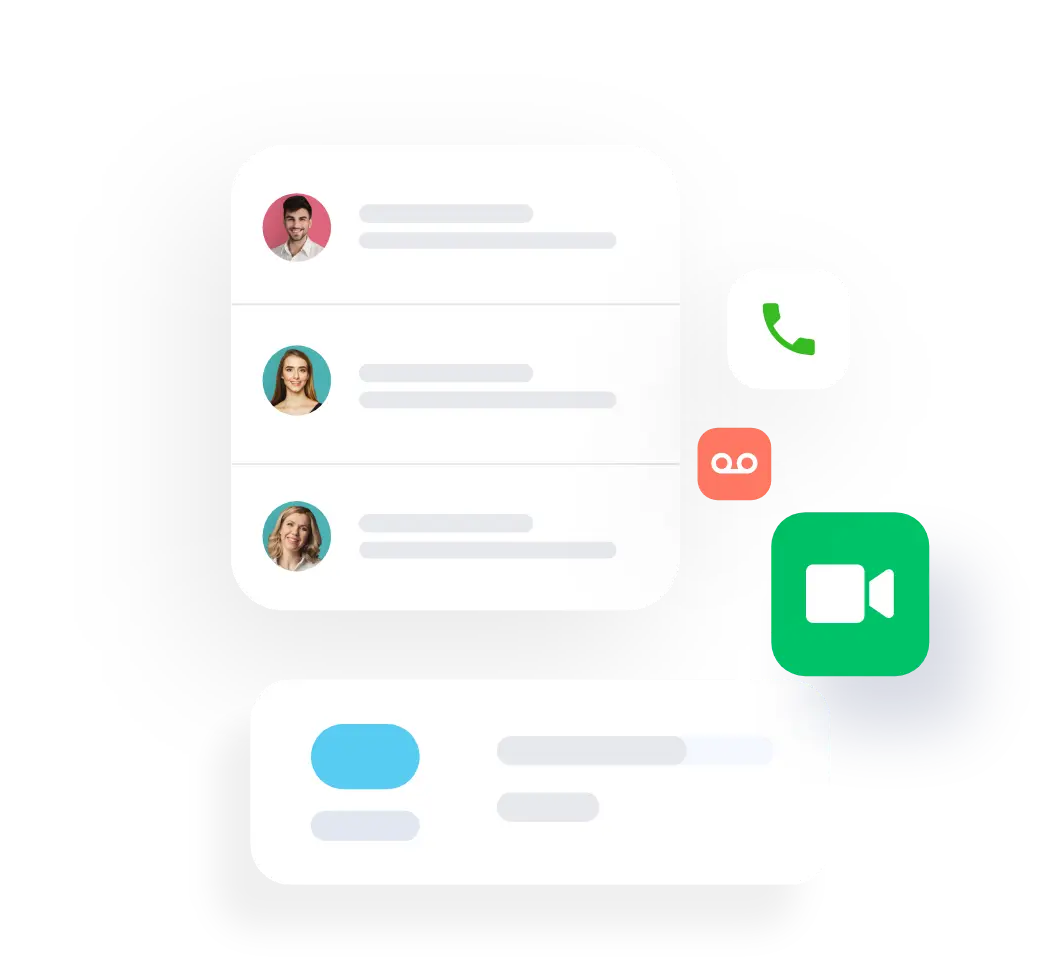Frequently Asked Questions VoIP Business
VoIP Business is a phone system provider focused on delivering the best VoIP office phone experience.

Frequently Asked Questions





VoIP stands for Voice over Internet Protocol. VoIP works by converting the analogue voice calls into packets of data. Then these packets travel in another form of data, for example e-mail, over the public Internet or any private Internet Protocol (IP) network. By a VoIP service, you can call any landline or mobile phone numbers.
There are three different methods to make VoIP calls:
- From your PC through the provider’s online Portal.
- From your VoIP handsets.
- From the VoIP Mobile App.
It is essential for businesses and employees to understand the way VoIP works.
How VoIP Works:
The analogue voltage sounds are converted to numbers and packed into “envelopes” called IP-packets. These IP packets are the identical type of packets that the Internet uses to carry web browsing and email worldwide. Through VoIP, you can call landlines and cell phones. You can also call from computer to computer, with both parties using the computer microphone and listening through the computer’s speakers or headsets.
It is important to note that you can make or receive calls through landline telephones. You just need an analogue telephone adapter which is connected to a network. Furthermore, you should consider using your VoIP or other communications systems on a private IP network to ensure the best voice quality and security.
It is very easy to make VoIP calls. Go to your Portal Section. You will see a dial pad and your phonebook. You can call on any number using the dial pad or if you already have that number in your phonebook, then go to the phonebook and dial from there.
There cost of VoIP services can vary depending on the several features such as the provider, features offered, type of service and scale of usage. However, VoIP is a cost effective solution compared to traditional phone system.
Anyone with a phone number and VoIP service can make calls over VoIP. You can also make conference call and international calls for much less when using VoIP.
Yes. To use VoIP Business you’ll need a broadband connection.
1. Businesses typically save between 40%–90% on the cost of their telephone system when moving from a traditional system to a VoIP system.
2. Hosted VoIP services do not require customers to manage and maintain expensive on-premise equipment, giving you more time and money to focus on running your business.
3. VoIP systems often offer greater mobility in managing and using your telephone system. Online portals allow quicker changes to your system, and many VoIP companies offer smartphone apps so you can make and receive your business calls on the go.
Traditional landlines typically use analogue voltage signalling through the copper wire to transmit sounds to a telephone. The copper wire is generally of a poorer quality (Cat-3), and the maximum distance is only a few kilometres. Phones have to be in this range to be linked to the PBX. On the other hand, in VoIP phones, the analogue voltage sounds are converted to numbers and packed into “envelopes” called IP packets. These IP packets are the identical types of packets, that the Internet uses to carry web browsing and email across the whole world. The IP packets contain the digitised voice carried across the company LAN (Local Area Network) or the Internet to every distant user, then they are unpacked from the IP packets and converted back to analogue sounds so the recipient can hear the voice.
Since the Internet can carry these packets everywhere in the world, the distance limitation between phones and PBX is no longer just a few kilometres.
There is no need to dial a special number. Making and receiving calls with the VoIP Business service is the same as with a standard telephone/mobile. For calls within the UK, you have to dial the full number, including the area code; for international calls, dial 00, followed by the country code. To dial other VoIP Business users, simply dial their VoIP Business ID from your VoIP Phone.
Yes, it is essential to have a fast and reliable internet connection to use VoIP. The minimum speed required for basic VoIP calls is 100 Kbps. The optimal speed suggested is 1Mbps or more per call especially when you have multiple users.
The users of VoIP will need the right equipment to get the full benefit of the host services and features of the VoIP. The VoIP service is absolutely scalable, which means the system is able to enhance or reduce to meet the user’s demand. There is a lot of hardware available in the market, but you don’t usually need most of it.
It is important to start with the basics. To set up VoIP you will need a high speed internet connection, VoIP phone, router, VoIP adapter and headsets.
That’s up to you. You don’t need an existing landline or mobile contract to use VoIP Business. Of course, if your internet connection is provided through your landline or mobile, you’ll still need that.
No. It’s FREE to sign up with VoIP Business, and there is no monthly subscription fee or hidden costs associated with the standard service. However, when you need advance features for your business you will have to pay monthly subscription fee. However, our pricing is transparent and there are no hidden charges.
VoIP Business allows you to keep your existing phone number while shifting to our VoIP service. You can receive all your calls through VoIP. However, It also depends on your existing telecom provider that they allow to port number or not.
VoIP can be easily set up and configured on most mobile devices. It offers greater flexibility and mobility. Your employees can use VoIP on any device be it a smartphone or laptop.
As a general guide, VoIP Business will use approximately 1MB of data per minute. It can be variable, depending on which additional features you are using. VoIP Business data consumption is equivalent to most other IP or cloud-based systems.
Unlike regular landline phones, VoIP phones require power to make calls. Therefore organizations should either provide a backup in case the power goes out in an emergency or add IP phones to the existing solution.
Pick up the phone and answer the call. VoIP should seamlessly replace your current phone service. If you are using a softphone, you need to have VoIP Business mobile app installed to receive the call. Then you should have to click to answer.
Yes, VoIP phones work with an IP address and are not bounded to single geographic location. IP addresses do not have physical locations, so you take your IP phone to any physical location with high-speed Internet.
Step 1:
Login into your VoIP Business account and go to settings.
Step 2:
Go to Admin settings.
Step 3:
Click on Users on the top left side of the menu.
Step 4:
Locate the user for whom you are trying to set up this call forwarding and click on it.
Step 5:
In the Dialog box that shows up, click on change button resent beside “when calls are not answered”. Now select forward to a to a user, team or IVR. select user to whom you want to forward calls.
There are seven types of call forwarding options available in the VoIP Business:
- Voicemail
- Extensions
- IVR
- Teams
- Call queue
- Forward to another number
All invoices for your account will be sent via email. You will be billed a month in advance. For example, your November 1st invoice will be for your November service. Any additional charges on your invoice will be from the month prior.
VoIP Business is self-service, so just add users using the app in just a few clicks. However, the number of users you can add depends on a plan you subscribed.
No. Receiving calls is free of charge.
No. Calls to ’03’ Numbers are charged by all operators at the same price as calls to ’01’ and ’02’ numbers.
You can still use VoIP Business’s services as a second phone line with a new number.
It varies. Mobile numbers are straightforward and take a couple of days. Other numbers can take anything from 7 to 20 days, depending on the provider we are transferring from. The process is quite old-fashioned and very fussy. Unfortunately, it’s not something we’re in control of, but we’ll always do our best to speed up the process for you.
They differ from numbers beginning ’01’ and ’02’ in one important respect – they are non-geographic; that is to say, an ’03’ number may be used anywhere in the UK. Calls to ’03’ numbers are charged at standard UK National Rate – exactly the same cost as calls to numbers beginning ’01’ and ’02’. Numbers beginning ’03’ are not premium rate numbers.
In addition to the UK, the EU Call Package includes calls to landlines and mobiles in Austria, Belgium, Bulgaria, Czech Republic, Denmark, Estonia, Finland, France, Germany, Greece, Hungary, Ireland, Italy, Latvia, Lithuania, Luxembourg, Malta, the Netherlands, Poland, Portugal, Romania, Sweden, Slovakia, Slovenia and Spain.
VoIP processes with extremely strong, 256-bit AES encryption. However, others are not as careful. Although encryption does enhance your safety, it doesn’t guarantee it. Your computer could be the weak link in your VoIP security chain. For example, if your PC is infected with malware, then whoever is controlling the malware might be able to check your phone calls and get hold of valuable information.
Yes, VoIP allows you to use your VoIP service wherever you travel on the condition that you have a high-speed Internet connection, a VoIP phone adapter or a mobile app. Through any of the mentioned mediums, you can call. There are no additional charges to worry about.
Yes, your VoIP provider might allow you to choose an area code of another area you are not living in. For Example, if you live in Austin and select a New York number, you will NOT have to pay any long-distance charges while calling a New York number, despite of where you call from. However, your “local” calls in Austin will be charged long distance. Furthermore, when your friends call your New York number from Austin, they will have to pay long-distance charges.
In addition, most VoIP providers offer virtual numbers (also called “virtual extensions”). This feature helps you obtain a number from a different area code and your current one. If you have relatives living in another city, they can dial your virtual number to reach you, which can also help them save the cost of long-distance charges.
There are no differences in technology or how you dial the number. However, Call charges differ from plan to plan. Charges for long-distance calls are typically quite high. Moreover, a lot of VoIP providers provide unlimited long-distance plans to offer affordable calling costs.
1. VoIP is very easy to Install, Configure, and Maintain.
IP Phones are easy to install, even for people with limited technical knowledge. Instead of needing someone to come and run phone wiring through your facility, you just need to set up an IP Phone and be all set to go quickly.
VoIP software offers low-cost to insert new users, and a suitable web portal makes it simple to move, add, or modify the system’s configuration. You won’t be installing VoIP hardware; you will only require IP phones and don’t even have to install the software.
2. VoIP scales up or Down effortlessly
It is not always simple to calculate how many phones you will require over the next year, and if you have a conventional phone system, you have to estimate cautiously to steer clear of spending money on phone lines you won’t utilize.
All this goes away with VoIP systems. If you choose VoIP for your business, you can add an extension the moment you hire a new employee, and if an employee leaves, you can simply relocate or remove the extension.
3. Employees’ numbers follow them wherever they go
Do you need to rearrange or expand your office space? A VoIP phone system lets every user access a suitable web portal to reconfigure the system anytime. Hosted VoIP phone systems are also excellent for businesses with field workers or who travel a great deal. You can forward calls to any place in the world through the cloud-hosted VoIP phone system features.
4. A variety of call features are supported.
Every conventional call system features you expect is available in VoIP systems, which includes call hold, call transfer, conference calling, find me / follow me, and auto-attendant phone menus.
5. Older Technology Like Fax Is Supported
Virtual faxing (IP faxing) is an additional feature of VoIP phone systems. Yet, in the age of email and instant communication, there are many instances when faxes are essential. Without the requirement for any paper or toner, you have the ability to send and receive faxes through the email account you previously had with a hosted business VoIP system.
6. Hosted VoIP Saves Businesses Money
Saving money is one of the most significant features of Business VoIP phone systems. Legacy systems are known for being expensive. The setup used to be invasive, reconfiguration needed time and physical system changes, and maintenance and repairs could be rather costly.
However, with VoIP systems, you not just save on installation expenses, but calls themselves are drastically less costly. If your business makes many international calls, business VoIP phone systems provide you with the savings you need to have a great phone system without an enormous capital investment.
7. VoIP Integrates With Other Business Systems
Because VoIP calls are internet-based, hosted VoIP systems are comparatively easy to incorporate with the business applications you use daily. You can place outbound calls via Outlook or any other email client or raise a consumer record with that customer’s inbound calls.
Voicemail accounts are available through email for employees who travel, and you can even get voicemail transcription with several hosted VoIP phone systems. This characteristic transcribes voicemail messages into text and routes them to your email account. Thus, you don’t have to be concerned about taking notes while conversing.
The feature you need is called ‘shared call appearance (or shared extension).
This feature is not available in VoIP Business. You cannot register two extensions “1234” simultaneously. The last one to register would get the incoming call. What you can do is you can set up a ring group with different extensions in it. Then you can use the “Ring all” strategy so that all the extensions registered in the group ring on an inbound call. However, the “follow me” feature also performs the same function.
The most significant benefit of switching to a VoIP system is its pricing. Usually, VoIP offers cheap local and international calls compared to a conventional phone system. There is not much hardware involved and the provided solutions also enhance the access to call reports, call recordings and call forward settings. All together cost of getting a VoIP system is inexpensive.
Other than the services charges for Junction Networks Services, surcharges, taxes, fees and additional charges might be applied to your monthly bill. And financial additions to your Prepaid Balance, based on the type of service you have, your geographical location and customer-entered 9-digit zip code, among other factors.
You should look for all the taxes and other features such as whether your provider is offering you a money-back guarantee and if they charge any cancellation fees. It is useful to decide before signing up for VoIP services if your chosen provider assesses any hidden charges.
SIP Trunking is a system through which business phone systems can operate by an internet connection instead of a conventional phone line.
No, you can only use VoIP if you have a working internet connection, even if your computer is turned off. You need to plug your telephone into the VoIP telephone service.

